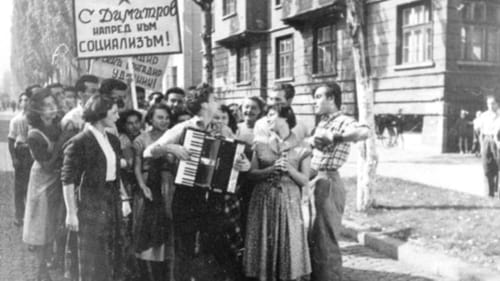
A man and a woman meet again after many years - on the territory and circumstances of post-socialist Bulgaria. A university graduate and poetess, forced to adapt herself to the new social environment, she survives in her own country as a tram driver. Having arrived for his father's funeral after years of travels abroad, he catches a glimpse of his old flame accidentally in a tram. Could they bring back their emotional time, the time of their lives? Could they try to resurrect whatever bound them together in their youth?

Nadeto
A pretty woman, divorced mother of a child works as a secretary at a research institute. She is taking an external degree. It all looks quite normal. In fact, she experiences serious difficulties: she has a problem with her ex-husband, her child is going through difficult age, a sycophant at the institute is exerting pressure on her, and the jealous wife of her boss makes malicious reports against her. She is forced to fight for each breath and to violate even her own principles in order to survive.

Sylvia es hija de un profesor. Sólo por ello sus profesores y compañeros de clase piensan que se trata de una alumna brillante. Cuando la joven está a punto de recibir una baja calificación en matemáticas debido a sus numerosas ausencias, ella misma hace una corrección en las listas de asistencia de los alumnos a clase, por la cual dos compañeros (que han perdido clases con la suficiente frecuencia) cargarán con sus faltas. Las consecuencias de este pequeño ajuste van a causar más dolor del que ella pueda suponer.

Misho becomes an orphan. The good people from the neighborhood take care of him until the child is placed in an orphanage. Everyone is trying to bring joy to the kid. However, Misho is searching for his mother's love in their eyes. Now the people are being kind to him, but there is always an invisible wall. Maybe uncle Elenko is the most sincere, since he shows his feelings in a tragic moment when Misho gets on a roof of a construction site. However, why does he care for Misho end with him convincing him to go to the orphanage?

The seven women inmates in Poslednata Duma are imprisoned because they have been associated with partisans opposing the fascist puppet government of the German Nazis. Each of them has the power to save herself if she will betray the others, and each bravely refuses to do so, even though it means they all will die. Despite their grim situation, and the atrocities perpetuated on them as political prisoners, they manage to laugh, and even celebrate a festival.

Maykata
Maria is having great difficulty getting on with her parents because of their blind, consumerist approach to life. Traumatized by continuous family dramas, having experienced the disappointments of firs love, Maria decides to go up the mountain to a holiday home. There she meets a conceited architect, a shy teacher, a jurist, and a timid journalist (all of them representatives of the intelligentsia) who are domineered by the manager of the holiday home and his 'problems'. Maria's resignation changes into a rebellion against impersonal submission and sheep-like compliance with those who hold power.

Tzvyata
The university student Bobchev joins a youth brigade. The commander's council entrust Bobchev with a literacy course for members of the brigade. Velizarov and Monkata arrive in the camp to carry out sabotage. They place explosives on the dam, and attempt to win Bobchev over by means of intrigue. There is a storm: the camp is put on the alert. Everyone joins the rescue work at the dam. After a long struggle with Velizarov, Bobchev cuts the burning fuse of the explosive. The dam does not yield to the pressure of the flood. Everymen sing in Jubilation.






